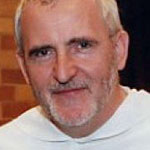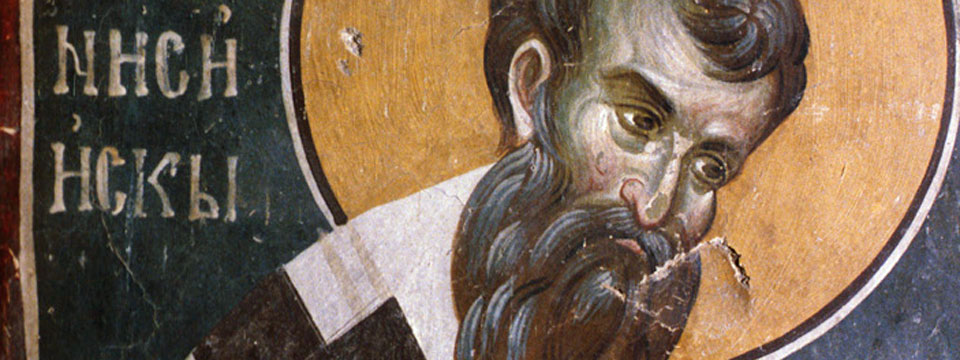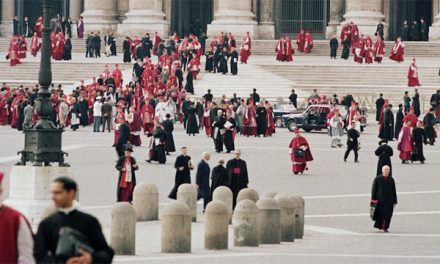The exclusive focus of attention, in this article, will be on the preaching to priests by two of the greatest saints of the Middle Ages, two Doctors of the Church, one from the 12th century, and one from the 14th; a man in one case and a woman in the other: St Bernard of Clairvaux and St Catherine of Siena.
St Bernard of Clairvaux
Bernards’s giving “breathing space”
One of the secrets of Bernard’s preaching is his ability, humbly and openly, to identify with those among his listeners in manifest distress of one kind or another, those in need of the grace of healing and of the help of God’s forgiveness, those who are still caught up “… in the snare of … evil propensities, still periously tempted.”{{1}} In one of his sermons, with an open and disarming honesty, St Bernard confesses:
Is not this how we too often feel? Is not this our experience at prayer, we who are tempted daily by our passions and filled with remorse for our past sins? O good Jesus, from what great bitterness have you not freed me by your coming, time after time? When distress has made me weep, when untold sobs and groans have shaken me, have you not anointed my wounded conscience with the ointment of your mercy and poured in the oil of gladness? How often has not prayer raised me from the brink of despair and made me feel happy in the hope of pardon?{{2}}
For those people, burdened with guilt and despair because of worldly weakness, Bernard, as preacher of the Word, is concerned to give what he calls “breathing space.”{{3}} But that does not mean he is a preacher of cheap and easy grace. No – Bernard understands that preaching must always be based on the full Gospel message. The Word which he proclaims, and the Word which he encounters in prayer, is the same Word, and it comes to him always “full of grace and truth.” Grace and truth – the two things are inseparable. For grace without truth – compassion without truth – would be a mere sentimentality, a false Santa-Claus god. And truth without grace – judgment without grace – would be a harsh, fundamentalist weapon, a complete negation of the Good News. Not surprisingsly, therefore, St Bernard prays that God would never come to him as truth only but always as truth and grace:
I need both of these: I need truth that I may not be able to hide from him, and grace that I may not wish to hide. Indeed, without both of these his visitation would not be complete, for the stark reality of truth would be intolerable without grace, and the gladness of grace might appear lax and uncontrolled without truth.{{4}}
What is true of prayer is true of preaching
What Bernard says so wisely here about prayer holds true also, of course, for preaching. Bernard knows that “Truth is bitter unless seasoned by grace.”{{5}} And, in the 12th century, there was no-one more than Bernard who deserved the title “preacher of grace.” According to his contemporary and good friend, William of St Thierry, “The force of his preaching began to shine out especially in the way in which he softened to conversion even the hard hearts of his hearers, and he rarely came home without a catch!”{{6}}
One of his most famous sermons is entitled, Ad clericos de conversione (“On Conversion: A Sermon to Clerics”). It was delivered once if not twice by Bernard in the early part of 1140 at Paris, and attended by a large group of scholars, student clerics, and priests. The sermon made an enormous impression and no wonder. In this particular sermon Bernard finds words of astonishing comfort and consolation for the person – whether priest or student – who knows himself to be “acutely or morally sick,” but who can find no release from his bondage, no remedy. That said, however, the sermon is not all comfort – far from it!
On clerical standards
Nowadays, we are accustomed to hearing strong and sometimes bitter criticism of the clergy, both within and outside the Church. But, reading this sermon of St Bernard, it’s hard to believe that there could be found anywhere today, even in the media, a criticism more biting and more deeply felt.
At that time, there was no shortage of men wanting to become priests. “The clerics in sacred orders,” Bernard says, “have multiplied beyond number.”{{7}} But, as the numbers of priests went up and up, the standards went down and down. Bernard writes: “People rush into holy orders all over the place and, without stopping to think, men appropriate for themselves the ministry which awes angelic spirits.”{{8}} Bernard speaks of “vile abominations, horrors in the house of God.” And he refers to “shameless acts,” things that cannot even be spoken of, crimes worse than “fornication, adultery and incest.” “Alas!” he says, “Chosen race, holy priesthood … who could have believed that such things should have come to pass in you.”{{9}} He asks the question: “Who spread the deadly virus?” And he answers: “Woe! Woe! The enemy of mankind [the devil] has … strewn the body of the Church with those damnable ashes, and even spattered some of her ministers with that stinking, putrid discharge!”{{10}} And he continues: “Stained like this, they [the clergy] go into the tabernacle of the living God. They dwell in the temple with these stains, profaning the Lord’s holy place, calling down upon themselves manifold judgment.”{{11}}
Preaching conversion
Judgment is a word St Bernard finds it necessary to pronounce here, but the key word in his sermon is not judgment but conversion. Bernard advises the men listening to him to prick up the ears of their inner hearts in order to hear what God is saying:
[T]hat voice offers itself, presents itself, never ceases to knock at the door of each one of us. Indeed, it says, “For forty years I was close to this generation and said, ‘They are people who err in their heart’.” He is still close to us, he is still speaking … wisdom is still crying aloud in the streets, “Turn back, trangressors, to your heart” … this voice is not only a mighty voice, it is also a beam of light both informing men of their transgressions and bringing to light things hidden in darkness…. What other effect does that beam or that word have than to bring the soul to self knowledge? It opens the book of conscience, passes in review the wretched sequence of life, unfolds the sad errors of its history, enlightens the reason and, the memory having leafed is set, as it were, before its own eyes … to be judged by its own thoughts. Who can support this judgment without distress? “My soul is troubled within me,” says the Lord’s prophet. Why be astonished then that you cannot stand before your own face without squirming, without feeling either distress or shame?{{12}}
It is not difficult to imagine the impact these words must have had on the clerics and students listening that day to St Bernard. He, the great preacher of truth, has brought them, as a group and individually, before the mirror of conscience. But he does not leave them standing there like men condemned. No, all of a sudden, with great daring, he suggests that their very wretchedness itself can somehow be the cause, or at least the occasion, of their beatitude. For it is when we have been utterly humbled by weakness that we are most likely to experience the grace of God’s mercy. And, in fact, just as a medical doctor needs our sickness in order to heal us of our distress, God’s mercy, in some sense, actually needs our misery:
Let the soul which is in this state harken to the divine voice, and to its own amazement and wonder it will hear it say, “Blessed are the poor in spirit, for theirs is the kingdom of heaven.” Who is poorer in spirit than the man whose spirit finds no rest and who has nowhere to lay his head? This also is a counsel of devotion, that the man who is displeasing to himself is pleasing to God, and he who hates his own house, that is to say a house full of filth and wretchedness, is invited to the house of glory…. It is no wonder if he trembles with awe at the greatness of this honour, and finds it hard to believe what he has heard, if he starts in astonishment and says, “Is it possible for such wretchedness to make a man happy?” Whoever you are, if you are in this frame of mind, do not despair: it is mercy, not misery, that makes a man happy, but mercy’s natural home is misery.{{13}}
Preaching that anoints the wounded conscience
According to Bernard, as soon as an individual’s wounded conscience is anointed in this way, he begins to “breathe more easily”.{{14}} And he begins to experience, even in this life, something of the light and happiness and refreshment of heaven itself, the beginning radiance of “the house of glory”. This grace, Bernard indicates, will manifest itself, first of all, in a new capacity to live the life of virtue, but also in a new and saving awareness of the felt presence of God. “There,” Bernard writes, “… once all the thorns and briers which earlier pricked the soul have been burnt, the spirit is pervaded with the balm of mercy and rests happily in good conscience…. Has it not been said: ‘Taste and see that the Lord is delightful’? This is hidden manna, it is the new name which no one knows except him who receives it. Not learning but anointing teaches it, not science but conscience grasps it.”{{15}}
Preaching wisdom more than knowledge
What Bernard is speaking about here is obviously not academic knowledge, but what he calls “wisdom.” And to acquire it, he tells us, “you consult books to no avail; you must try to experience it instead.”{{16}}
Wisdom, as it happens, is a central theme in another impressive text of St Bernard entitled De Consideratione (“On Consideration”), This text is not, as it happens, a sermon in the strict sense of the word. Nevertheless, in this text we can hear, as strong and impressive as ever, the voice of Bernard, the great preacher. And, in all of the literature of the Middle Ages, this particular text contains what are some of the most helpful and illuminating statements concerning priestly and pastoral life. The text itself was eventually made available to the public, but the person to whom the work was actually addressed was none other than Pope Eugene III. Why Bernard presumed to give advice to the most honoured priest among his contemporaries, the Pope of the day, is because Eugenius, as a young man, had been a monk in Bernard’s monastery. If one came upon the text, by chance, and didn’t know to whom or for whom it was written, one might very easily conclude, reading parts of it, that it was an epistle, or an extended homily, addressed by the Abbot of Clairvaux to a busy parish priest, someone badly in need of good advice.
Preaching self-knowledge
The word “consideration” occurs over and over again in the text. What Bernard means by it is something close to the idea of “contemplation.” But, unlike contemplation, which is largely intuitive, consideration is a more discursive activity. It demands or involves actively thinking and reflecting on a particular subject. Consideration, as Bernard understands it, means standing back from one’s daily tasks and preoccupations, and assessing them in the light of God’s truth.{{17}} He writes: “[F]our subjects are worthy of your consideration: yourself, things below you, things around you, and things above you.”{{18}} For reasons of time and space, I will be able to focus, in this paper, only on the first of these themes. St Bernard, before attending to anything else, invites us to come to know ourselves, to be wise in our own regard. Wthout that knowledge, he explains, all other wisdom adds up to nothing. Bernard writes:
Let your consideration begin with yourself lest, while spending your energies fruitlessly on other things, you neglect yourself …; if you do not belong to yourself, you lack wisdom towards yourself. And, if so, to what extent then are you lacking in wisdom? In my opinion, completely. For although you may know all the mysteries, and know the breadth of the earth, the height of the heavens, the depth of the sea, if you do not know yourself, you will be like a man building without a foundation… Whatever structure you raise outside yourself will be like a heap of dust before the wind. For the man who is not wise to himself, is not wise.{{19}}
Preachers building life resources for preaching
Bernard is not suggesting here a monastic recoil from the pressures of pastoral life. More than anything else, he wants Eugene to be a dedicated pastor, a true shepherd. But he is afraid that the pressures of a busy life can so absorb the energies of the pastor or the priest that the meaning of that life can get completely lost. When this happens, the pastor may find he has no resources to fall back on, especially when things go wrong, and all his best efforts, as pastor, are frustrated or undermined. Bernard writes: “How often do you move, but not move forward? How often do you attempt, but without the least result? put yourself forward and achieve nothing? How often are you in labour, and do not bring forth? venture [out to sea] and get washed away? where you begin, there make an end? And just as you are beginning to launch out, find yourself cut down?”{{20}} Given these circumstances and they are circumstances with which every busy pastor today can identify Bernard recomments “consideration,” the wisdom of stepping back to find one’s breath, as it were, and recover a saving perspective on what it is one is attempting to achieve. He writes:
If you give all your life and all your wisdom to action, and nothing to consideration, will I praise you? No, in this matter, I will not praise you…. Actions not preceeded by consideration lead nowhere. If you wish to belong completely to other people, like Him who became all things to all men, I praise your humility, but only if it is full. But how can it be full if you yourself are excluded? You, too, are a man. So, in order that your humanity may be full and complete, let your bosom, which receives all, make space also for yourself. Otherwise … what does it profit you if you gain the whole world, and lose your own self? (Mt 15:26) So, while all possess you, see that you are one among them…. All others drink at the public fountain of your heart, and will you stand aside and thirst? … Yes, let your waters stream down into the streets; let men and flocks and herds drink there … but, among the rest, let you yourself drink from the spring of your own well…. Are you a stranger to yourself? Then to whom are you not a stranger? In short, if someone is bad to himself, to whom will he be good? So, remember, I do not say always, I do not say often, but at least sometimes render yourself to yourself.{{21}}
Catherine of Siena
The voice of a child; the voice of a prophet
St Catherine of Siena, during her short life, wrote many letters to priests. But she also wrote or dictated letters to all kinds of people: to members of her own family, to hermits, widows, cardinals, nuns, a mercenary soldier, a king, a queen, a prostitute, a lawyer, a poet and, of course, most famously of all, to two popes. Catherine, when she corresponds with all these people, writes at times with the daring of a girlchild, at other times with the seeming authority of an Old Testament prophet. She cajoles, she pleads, she encourages, she bullies, she inspires. We might think that the Abbot of Clairvaux was rather forward in the way he wrote to Pope Eugene. But St Catherine was, in fact, far more audacious. Whereas Bernard, when he wrote to the Pope, spoke with considerable hesitation regarding the advice he wanted to give, declaring, “It is not consistent with my humility to tell you that such and such a thing should be done. It is enough for me to have intimated that something ought to be done so that the Church may be consoled.”{{22}} Catherine, in contrast, when writing to the Pope, drives home her point without the least hesitation, and with an almost fierce determination. With regard to the return of Pope Gregory XI to Rome, for example, she makes bold to say: “Up, father, courageously! I tell you, you have no need to fear. But if you don’t do as you should, you may well have reason to be afraid. It is your duty to come. So come! Come trustingly, without any fear at all.”{{23}}
Pope Benedict XVI, commenting on the contribution made to the Church by people like Catherine, remarked on one occasion, “How could we imagine the goverment of the Church without this contribution, which sometimes becomes very visible, such as when St Hildegaard criticised the Bishops, or when St Bridgit offered recommendations, and St Catherine of Siena obtained the return of the Popes to Rome?”{{24}} Of course, this grace of teaching or preaching belongs to what Pope Benedict calls the “charismatic sector” as distinct from “the ministerial sector in the strict sense of the word.”{{25}} Nevertheless, the contribution which someone like Catherine of Siena was able to make to the Church is, according to Pope Benedict, “always a crucial factor without which the Church cannot survive.”{{26}}
Her unique genius
A measure of the uniqueness and great strength of Catherine of Siena’s character and personality is that a sharply defined impression of her spirit still survives today in her writings, a spirit at times disconcerting to the modern reader. But so eloquent is Catherine in her Dialogue and in her Letters as preacher of God’s Word, and so profound is her grasp of Catholic doctrine, I sometimes wonder if she is not, perhaps, one of the two or three most outstanding Christian preachers of all time.
Her deep respect for the priesthood
Catherine’s respect for the priesthood knew almost no bounds. Again and again her letters will begin with a phrase such as the following: “Dearest and very loved father, I call you father in reverence for the sweetest of sacraments, the dear body of God’s Son.”{{27}} And, on another occasion, writing to a number of priests in the same letter: “Dearest, very loved fathers – I call you fathers in reverence for that sweetest of sacraments [which is yours to administer].”{{28}}
In her dialogue with God the Father, a Dialogue which constitutes her single most important text, the Father speaks to her at length about the holy lives of good priests. These men, these “glorious ministers,” He tells Catherine, are “stewards of the light.”{{29}} And to explain what He means by that fine phrase, the Father makes use of an unexpected but very powerful image, one that pays priests an enormous compliment. “[T]hese ministers of mine,” He says, “are suns because they have taken on the qualities of me, the true Sun. By love they have been made to be one thing with me and I with them.”{{30}} And, what is more, “they behave,” the Father explains, “as the sun does”:{{31}}
The sun warms and enlightens, and with its heat makes the earth bring forth fruit. So also these gentle ministers of mine, whom I chose and anointed and sent into the mystic body of holy Church to be stewards of me, the Sun, that is, of the body and blood of my only-begotten Son along with the other sacraments that draw life from this blood. They administer it both actually and spiritually by giving off within the mystic body of holy Church the brightness of supernatual learning, the colour of a holy and honourable life in following the teaching of my Truth, and the warmth of blazing charity. Thus with their warmth they cause barren souls to bring forth fruit and enlighten them with the brightness of learning.{{32}}
By far the greatest compliment which the Father pays to priests in the Dialogue is when he refers to them, on occasion, as “my Christs.” “They are my anointed ones,” He says, “and I call them my ‘christs’ because I have appointed them to be my ministers to you and have sent them like fragrant flowers into the mystic body of holy Church. No angel has this dignity, but I have given it to those men whom I have chosen to be my ministers. I have sent them like angels, and they ought to be earthly angels in this life.”{{33}} Needless to say, not all priests live up to this ideal. In spite of the “tremendous grace and blessing” they receive, and in spite of the fact that “it is impossible,” according to the Father, “to have a greater dignity than theirs in this life,” they sin against God, and “against their own dignity.”{{34}} To Catherine, the Father goes on to say: “I demand purity and charity of every soul…. But much more do I demand purity in my ministers, and that they love me and their neighbours, administering the body and blood of my only-begotten Son with burning love and hunger for the salvation of souls, for the glory and praise of my name.”{{35}} What we are privileged to hear, in this text, is what we might call God’s own message for priests, God’s preaching. And it’s precisely that “holy preaching” which, again and again, we find echoed in Catherine’s letters. Here, for example, is an extract from a letter she wrote to Pietro, a priest of Semignano:
Consider your dignity, since God has in mercy given you the great distinction of having to dispense the fire of divine charity, the body and blood of Christ crucified. Just think! Not even the angels have such dignity! See how God has put his word into the vessel of your soul. You know very well that when you speak in the person of Christ, you have the authority to consecrate that wonderful sacrament. So you must carry this word with an immense fire of love, with spiritual and bodily purity, and with a peacable heart, dispelling all hatred and animosity from your soul.{{36}}
It would appear that this particular priest was very far from living up to the high ideal of the Catholic priesthood. He was, in fact, provoking serious scandal. As a result, Catherine can hardly contain her feelings of disappointment and displeasure. She writes: “Alas! Alas! Where is the purity of the ministers of God’s Son? Reflect that just as you demand that the chalice you carry to the altar be clean and would reject it if it were dirty, so God, supreme eternal Truth, demands that your soul be pure and clean.”{{37}} Chosen ministers who are expected to be “God’s temples carrying the fire of God’s word” are instead, Catherine says, carrying within their souls, “the fire of anger, hatred, animosity, and ill will.”{{38}} Some among the priests, she notes, have even become “lodgings for pigs and other animals!” Catherine exclaims: “Alas! How bewildering to see Christ’s anointed ones giving themselves over to such wretchedness and immorality!”{{39}} Later, in the same letter, Catherine refers to the bitter hatred which the priest to whom she is writing continues to harbour towards a fellow priest. She writes:
“What a bewildering thing it is to see two priests living in mortal hatred! It’s a great miracle that God doesn’t order the earth to swallow up the pair of you!”{{40}}
“Dearest son and father in Christ Jesus!”
Catherine is never content simply to criticise the priests to whom she is writing. She always offers hope and she offers wisdom. And quite often, as with Bernard of Clairvaux, the form that wisdom takes is an exhortation to what she calls “self-knowledge in God.” The fruits of such knowledge are twofold: first, those who are priests discover how poor and needy they really are as men; and, second, they discover – and this is even more important – that each one of them is infinitely loved by God, and has been individually chosen by God for a hugely privileged task. To one priest, living in Bologna, Catherine writes: “Self-knowledge is the dwelling in which we discover our own lowliness, and this makes us humble. There we find the knowledge of God’s goodness too, and in this light a warmth, a fire of love, is born in us – so gently that all bitterness becomes sweet, everything weak grows strong, and all the ice of selfish love melts away.”{{41}} And she adds: “Dearest son and father in Christ Jesus, let’s not put off any longer our move into the holy dwelling of self-knowledge. We so need this, and it is so pleasant for us – because, as I have said, God’s boundless infinite goodness is there.”{{42}}
To one friar who had run away from his convent, Catherine again speaks of the need for self-knowledge. But, first of all, she talks to him about the wonderful mercy of God: “In this mercy you will find relief from the terrible dejection that seems to have come from seeing yourself fallen…. Hide yourself under the wings of God’s mercy, for he is more ready to pardon than your are to commit sin.”{{43}} When she comes to speak directly about self-knowledge, Catherine composes what I consider one of the most interesting paragraphs in all her writing. The stark need and manifest vulnerablity of this wayward friar seems to draw from Catherine, and as almost never before, words and images radiant with hope and blessing. How can someone who feels so utterly weak expect to overcome the power of sin and temptation? How can he move the stone which blocks his way to the new life? Catherine writes:
Go into the tomb of self-knowledge, and with Magdalen ask, “Who will roll back the stone from the tomb for me? For the stone (that is, the guilt of sin) is so heavy that I can’t budge it.” And as soon as you have acknowledged and confessed how imperfect and heavy you are, you will see two angels, who will roll this stone away. I mean that divine help will send you the angel of holy love and reverence for God … and the angel of hatred [that is, hatred of sin] … to roll this stone away. So, with true hope and lively faith, never leave the tomb of selfknowledge. Persevere in staying there until you find Christ risen in your soul by grace. Once you have found him, go and proclaim it to your brothers.{{44}}
Unexpectedly, with the word “brothers,” Catherine intends to draw attention not to other people, the possible objects of the friar’s preaching, but first of all to what she calls “the true, solid, lovely virtues.”{{45}} These virtues must first be acquired, Catherine says. Only then will you really begin to experience Christ risen in your heart and in your life, and begin to enjoy a personal and living experience of the mystery. “Then,” Catherine writes, “Christ lets you touch him in continual humble prayer by appearing to your soul in a way you can feel. This is the way; there is no other.”{{46}}
Her acute perception of human nature
Normally we are inclined to think of mystics as people contemplative first and last of God and of the nature of God. But, to a degree almost unique among the Christian saints and mystics, Catherine was contemplative also of human nature, of both its misery and its grandeur. In particular, she understood an aspect of our human condition and of our human psychology which, over the last two hundred years, has begun to receive increasing attention from both psychologists and philosophers, namely the psychology of fear. In her letter to the friar she speaks of “slavish fear” (un timore servile).{{47}} For the majority of spiritual authors it has always been enough simply to address what they perceived as the three most obvious enemies of freedom: the world, the flesh, and the devil. Catherine herself names these three enemies, and over and over again. But then she does something else, something more. With a quite remarkable grace of insight, she uncovers, at the root of human weakness and human distress, the face of fear. And she names for us – now in one letter now in another – some of the many different forms which fear assumes, noting for example how afraid we can become of other people, afraid that is of what they think of us and of how they judge us, or afraid of death and suffering, or of God’s judgment, or afraid even of ourselves, afraid of our own weakness and our spiritual and moral failure. To one priest she writes: “Start being brave about everything, driving out darkness and spreading light as well. Don’t look at your weakness, but realise that in Christ crucified you can do everything.”{{48}} But, of course, this is easier said than done. Catherine understands very well that an individual can, at times, feel so caught up in the coils of sin that he or she begins to suffer a virtual moral paralysis. At this point, in St Catherine’s understanding, the sinner is not just wicked or not just worldly. The sinner is afraid. He has become “weak” and “fearful” and “slavishly timid,” Catherine says, and is “afraid even of [his] own shadow.”{{49}}
Empathy for the sinner
Catherine makes this observation when writing to a certain Bishop from Florence called Angelo Ricasoli. From start to finish her letter reveals how well she understands just how helpless and hopeless the sinner can feel with regard to the Gospel call to perfection. She writes: “Perhaps the thought might arise in our hearts: ‘I can’t pursue that sort of perfection; I feel that I am frail and weak and imperfect. I am worn down by the devil’s wiles, by the weakness of my flesh, by the world’s allurements and deceit.’ True, reverend father, it can’t be denied that if you follow the world you will grow weak, so fearful and slavishly timid that like a child you will be afraid of your own shadow.”{{50}} But, Catherine then goes on to say, “Boundless Goodness has, however, given us a remedy for all our weakness in his wondrous charity.”{{51}} Accordingly, like a child going to its mother, the sinner should go to God, Catherine says, bringing all fear and all weakness into the presence of love. Love – the “wondrous charity” of God – she explains, is the “gentlest of mothers.”{{52}}
Assuaging fears
Of all the letters which touch on the theme of fear, one of the most impressive is a letter Catherine sent to a woman called Costanza Soderini. In the first place, Catherine outlines a number of the fears which usually prevent us from being free. She writes: “Sometimes people suffer a great deal from fear of death and because of their self-indulgence. The first is a delusion the devil puts in their minds. He says, ‘You see that you are going to die, and that you haven’t done a bit of good! So do you know where you’re going? Your deeds have earned only hell!’ On the other hand, he makes them feel sorry for themselves by saying, ‘Just think! Your body is so pampered now with worldly pleasures, but soon you will die.’”{{53}} The devil, Catherine explains, exploits the deepest human fears in order to lead people into “discouragement and despair”: “He wants them to see only their short-comings and sins, and to hide the divine mercy from them.”{{54}} So how, then, are we to address the situation? Catherine’s answer reveals two things: first, how sharp her grasp is of human psychology and, second, how profound her understanding of the nature of God’s mercy. She writes:
We have to counter the devil’s great malice by responding to these interior suggestions of his. Turning our gaze to our Creator, we should say, “I acknowledge that I am mortal, but this is a tremendous grace for me, since death will bring me to my goal, to God who is my life. I acknowledge, too, that my life and deeds deserve only hell. But I have faith and trust in my Creator, in the blood of the Lamb who was slain and consumed, that he will pardon my sins and grant me grace. I will try in this present time to amend my life. But if death should overtake me before I have amended my life – that is, before I have yet done penance for my sins – I [still] say that I trust in Domine nostro Jesu Christo, because I see that there is no comparison between my sins and divine mercy. Even if all the sins that could possibly be committed were gathered together in one person, it would be like a drop of vinegar in the sea.”{{55}}
The message is clear. “No more fear!” Catherine says. “Live this bit of time in joy with a desire for virtue.”{{56}}
Merit grows in humility
Because priests live so close to the divine mysteries, the light cast on their human weakness and mediocrity can, on occasion, be almost impossible to bear. How many times the words of St Peter rise spontaneously to the lips of the ministerial priest: “Depart from me, Lord, for I am a sinful man!” It is not known what exactly was the nature of St Paul’s “thorn in the flesh.” It may or may not have been a moral weakness or vulnerability. But we do know that it was something humiliating for him. It’s not difficult to understand, therefore, the passion and sincerity with which Paul must have prayed to be released from that particular hurt or weakness or humiliation. But God did not remove the thorn. Why?
Astonishingly, in the Dialogue of Catherine of Siena, God the Father gives us an answer to this question. And He is thinking here not only of the “thorn” which afflicted St Paul, but also of the humiliation of weakness which afflicts those whom He calls “my great servants,” by which He means ministerial priests in particular. Here is what the Father says to Catherine on the subject: Sometimes my providence leaves my great servants a pricking, as I did to my gentle apostle Paul, my chosen vessel. After
he had received my Truth’s teaching in the depths of me the eternal Father, I still left him the pricking and resistance of his flesh. Could I and can I not make it otherwise for Paul and the others in whom I leave this or that sort of pricking? Yes. Then why does my providence do this? To give them opportunity for merit, to keep them in the self-knowledge whence they draw true humility, to make them compassionate instead of cruel toward their neighbours so that they will sympathise with them in their labours. For those who suffer themselves are far more compassionate to the suffering than are those who have not suffered.{{57}}
Suffering in the life of a priest
Catherine has a lot to say about the role of suffering in a priest’s life. To Ranieri, a Dominican priest, for example, she writes: “In this life we are set as on a battlefield and we must fight courageously, not dodging the blows or retreating, but keeping our eyes on our captain, Christ crucified.”{{58}} And again:
I want the tree of the cross to be planted in your heart and soul. Conform yourself with Christ crucified…. As St Paul says, glory in the cross of Christ crucified…. Fasten your heart and affection to the cross with Christ, for the cross has been made a ship for you and a port that will lead you to the [ultimate] port, salvation … when your life is finished you will after your labours come to rest and see the supreme eternal beauty and vision that is God, where your soul is quieted and stilled. Every suffering and evil ended, you will receive every good, satiety without boredom and hunger without pain. Finish your life on the cross. Keep living in God’s holy and tender love.{{59}}
Here, Catherine speaks of the “ship” which will bring us safe to our ultimate port, our final destination. That image of the ship is, as it happens, one which we often find in Catherine’s writings. It occurs, for example, in a particularly memorable passage she wrote to her great priest-friend, Blessed Raymond of Capua. I cite it here by way of conclusion to our reflections because, first and last, it is a passage of great encouragement for those among us who may be experiencing enormous difficulty at this time. But, also, because the passage draws our attention to the gracious, intercessory power of Mary our Mother. Catherine writes:
I’ve heard … that you have been experiencing tremendous struggles and that your spirit has been overtaken by darkness because of the devil’s illusions and deceits. He wants to make you see the crooked as straight and the straight as crooked, and he does this to make you stumble along the way so you won’t reach your goal. But take heart. God has provided and will continue to provide for you, and his providence will not fail you. See that in everything you turn to Mary as you embrace the cross. And don’t ever give in to spiritual discouragement, but navigate the stormy sea on the ship of divine mercy.{{60}}
[[1]]St Bernard of Clairvaux, Sermon 32:3, On the Song of Songs, Vol 2, trans., K. Walsh (Kalamazoo 1976) p. 136.[[1]]
[[2]]Ibid.[[2]]
[[3]]Sermon 11:2, Vol 1, p. 70.[[3]]
[[4]]Sermon 74:8, Vol 4, pp. 92-3.[[4]]
[[5]]Ibid., p. 93.[[5]]
[[6]]William of St Thierry, Vita Prima, I.13.61; PL 185:260 CD, cited by Marie-Bernard Saïd, OSB in Bernard of Clairvaux: Sermons on Conversion (Kalamazoo 1981) pp. 14-15.[[6]]
[[7]]St Bernard of Clairvaux, “On Conversion: A Sermon to Clerics,” XX, 34, in Sermons on Conversion, (Kalamazoo 1981) p. 72.[[7]]
[[8]]Ibid.[[8]]
[[9]]Ibid., p. 73.[[9]]
[[10]]Ibid., pp. 73-4.[[10]]
[[11]]Ibid., p. 74.[[11]]
[[12]]Ibid., II, 3, pp. 33-4.[[12]]
[[13]]Ibid., VII, 12, pp. 45-6.[[13]]
[[14]]Ibid., VIII, 13, p. 47.[[14]]
[[15]]Ibid., XIII, 25, pp. 60-1.[[15]]
[[16]]Ibid., p. 60.[[16]]
[[17]]See Jean Leclercq OSB, “Introduction to ‘On Consideration’,” in Bernard of Clairvaux: Selected Works (New York 1987) pp. 146-7.[[17]]
[[18]]St Bernard of Clairvaux, De consideration, Bk.2, 417, Ch.3, in S.Bernardi opera omnia, Vol 1, PL 182, 745.[[18]]
[[19]]Ibid.[[19]]
[[20]]Ibid., 408, Bk 1, Ch.1, 730.[[20]]
[[21]]Ibid., Bk 1, 411, Ch.5, 734-35.[[21]]
[[22]]De consideration, Bk.2, 417, Ch.4, in S.Bernardi opera omnia, Vol 1, PL 182, 744.[[22]]
[[23]]St Catherine of Siena, Letter to Pope Gregory XI, in The Letters of Catherine of Siena, Vol 2, trans., S. Noffke (Tempe, Arizona 2001) p. 213.[[23]]
[[24]]Pope Benedict XVI, “Meeting with Members of the Roman Clergy,” Hall of Blessings, Thursday, 2 March, 2006.[[24]]
[[25]]Ibid.[[25]]
[[26]]Ibid.[[26]]
[[27]]Letter to Don Giovanni dei Sabbatini of Bologna, The Letters of Catherine of Siena, Vol 1, p. 144.[[27]]
[[28]]Letter to Frate Bartolomeno Dominici and Frate Tommaso d’Antonio, The Letters, Vol, 1, p. 38.[[28]]
[[29]]Catherine of Siena, The Dialogue, 119, trans., S. Noffke (New York 1980) p. 221.[[29]]
[[30]]Ibid., p. 222.[[30]]
[[31]]Ibid.[[31]]
[[32]]Ibid.[[32]]
[[33]]Ibid., 113, p. 212.[[33]]
[[34]]Ibid.[[34]]
[[35]]Ibid.[[35]]
[[36]]Letter to Pietro, Priest of Semignano, The Letters, Vol 1, p. 276.[[36]]
[[37]]Ibid., p. 277.[[37]]
[[38]]Ibid.[[38]]
[[39]]Ibid.[[39]]
[[40]]Ibid., p. 278.[[40]]
[[41]]Letter to Don Giovanni dei Sabbatini of Bologna, The Letters, Vo 1, p. 145.[[41]]
[[42]]Ibid., pp. 145-6.[[42]]
[[43]]Letter to a Brother who has left his Order, The Letters, Vol 2, pp. 510-11.[[43]]
[[44]]Ibid., p. 512.[[44]]
[[45]]Ibid.[[45]]
[[46]]Ibid., p. 513.[[46]]
[[47]]Ibid., p. 508.[[47]]
[[48]]Letter to Frate Bartolomeo Dominici in Asciano, in The Letters, Vol 1, p. 21.[[48]]
[[49]]Letter to Bishop Angelo Riscasoli in Florence, The Letters, Vol 1, p. 228.[[49]]
[[50]]Ibid.[[50]]
[[51]]Ibid., p. 229.[[51]]
[[52]]Ibid.[[52]]
[[53]]Letter to Costanza, wife of Niccolò, The Letters, Vol 2, p. 486.[[53]]
[[54]]Ibid.[[54]]
[[55]]Ibid.[[55]]
[[56]]Ibid.[[56]]
[[57]]The Dialogue, 145, p. 305.[[57]]
[[58]]Letter to Frate Ranieri in Pisa, The Letters, Vol 2, p. 108.[[58]]
[[59]]Ibid., pp. 110-12.[[59]]
[[60]]Letter to Frate Raimondo da Capua, The Letters, Vol 2, p.473.[[60]]






